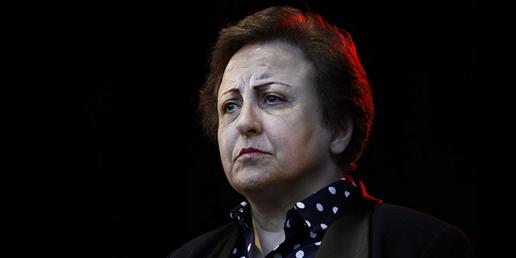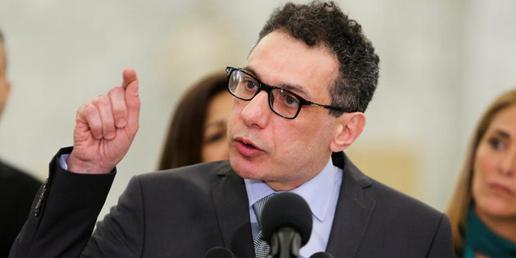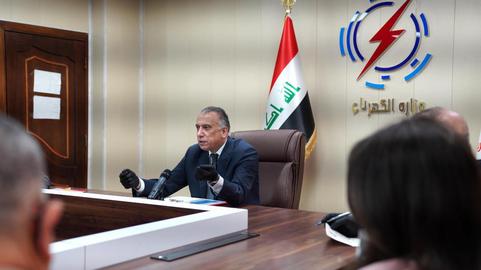Iranian human rights activist, lawyer and Nobel Peace Prize laureate Shirin Ebadi has praised Nizar Zakka, the Lebanese ICT expert and internet freedom advocate jailed in Iran for four years, for his moral courage to be able to speak out about the torture and humiliation he faced while behind bars.
On August 19, IranWire released a short film, The Treacherous Host, which documents the Islamic Republic’s kidnapping and imprisonment of Zakka. In the film, Nizar Zakka describes the tactics his interrogators used to intimidate him and try to make him confess to fabricated charges of espionage.
“I know that many people have had the same fate as Mr Zakka and suffered enormously,” Ebadi told IranWire. “After their release, they could not share their stories openly with the public and the international community ... Nizar Zakka described everything that happened in detail in this film.” However, she says, until the constitution of the Islamic Republic is reformed, the Iranian regime will continue to take people hostage to leverage financial and political gain, despite what she described as Zakka's and others' "commitment to justice."
Zakka traveled to Iran in 2015 at the invitation of Shahindokht Molavardi, the then Vice President for Women and Family Affairs, to attend the International Conference on Women's Role in Sustainable Development. He was arrested on charges of "spying for a hostile country" and spent four years in prison. He is one of many people who have been persecuted, humiliated, tortured and jailed by the Islamic Republic, and who have been both accused of espionage and pressured to spy for Iranian agents.
At the end of the film, Zakka pledges to help other people held illegally in Iranian jails. “This is the worst thing, to leave and feel these people are left behind. Now my therapy is working to get other people out. Every single thing, every single thing I can do in my capacity — the UN, to appoint lawyers, to talk to their families, to visit their families...today, the only passion I have is toward the hostages, not about anything else."
Shirin Ebadi, who left Iran in June 2009 and is based in the United Kingdom, says she believes there are currently about 35 dual-national hostages in prison in Iran. The world does not know most of their names. She has worked as a lawyer defending some of these people, and people in similar situations. "One of my clients, an Iranian-American citizen and researcher working on Iranian issues, encountered this many years ago,” Ebadi told IranWire, adding that she was not at liberty to give his name for reasons of lawyer-client confidentiality. "He had traveled to Iran and when he was about to leave, when he was on his way in a taxi to the airport from his house, a car and several motorcyclists surrounded him and blocked the taxi. They attacked my client, seized his personal belongings and bag containing his phone, his identity documents, and his computer. It was so dramatic and happened so quickly that my client thought he was being robbed. The next day he went to the police to report it. After being asked several questions, he was arrested. I was given power of attorney by his family to pursue the case and defend him.”
Although the family appointed Ebadi, she was not able to actually defend him, another tactic that has been used by authorities, especially in recent years, where prisoners held on charges related to national security have been forced to appoint a lawyer from a pre-approved list of attorneys. “I could not read the case or even see my client,” she told IranWire.
The Spying Game
Ebadi said she knew about another former prisoner, an Iranian who had been based in France. The man, a member of the French Socialist Party, had traveled to Iran to see his family. “He was arrested, pressured and told to cooperate with the Iranian government,” Ebadi said. “They keep telling him he should not forget he is an Iranian and that he should consider the interests of his country.” He was an experienced politician but felt he had no option but to say yes when the authorities pressured him to spy for Iran. She said agents told him how to pass on information to them clandestinely and gave him further training as a spy and then said he was allowed to go.
“He explained to me that the first thing he did, even before he got home from the airport, was to inform the authorities [and tell them] that such a request had been made ... and that he had made such a promise in order to leave.” He also told the French government what equipment and instructions he’d been given. French authorities told him to move to a new location immediately and change his phone number and any other information that could help Iranian agents track him down. Although Ebadi said there was no guarantee he could be kept safe, details of his case were registered with the French Ministry of Foreign Affairs.
Ebadi also mentioned the case of Behdad Esfahbod, a Facebook employee and resident of Canada who had come to Iran to visit his family. When agents arrested him, they confiscated his devices and downloaded all his contacts and correspondence. “This person intelligently promised to cooperate and when he left Iran, he explicitly stated — without considering personal interests — that he has left Iran and made such a commitment, and that the Iranian government has asked him to collect and provide information about human rights activists outside Iran.”
Although the cases all bear similarities, Iranian authorities are shrewd and often change the specifics of what they request. It’s also not just one type of person they target. “One is arrested for barter and business, one for information, and a third for espionage,” Ebadi says.
Sending Signals to the World
“I know of an Iranian-Canadian woman who was arrested for no apparent reason during a trip to Iran," Ebadi told IranWire. "She had traveled to Iran many times before and never arrested. She was harassed for a while and then released. Ebadi says that in many ways, Iran’s tactic of taking hostages is about sending messages to the international community, not merely to its own people or the people it wants to destroy.
“The Iranian government does this for several purposes. Take the case of Omid Kokabee, the young researcher and scientist who had gone to Iran to visit his family, and was kept in prison even when he developed kidney cancer. A number of well-known international physicists spoke out and said Omid Kokabee was not guilty and should be released.” Kokabee was arrested in 2011 on espionage charges and given a 10-year prison sentence. He was eventually released in 2016.
“‘Know that we have this power,’ they are saying. ‘ If you want to get along with Iran, you need to know exactly which faction and group you have to deal with, and to whom or whom you have to make concessions, and who has the real power.’ It’s a kind of signaling to show where the real power is in Iran and who is in charge. Of course, these factors vary depending on the time and place. Today one group is at the top of power and the next time, another group."
Is Molaverdi to Blame?
In The Treacherous Host, Maziar Bahari and Nizar Zakka make several attempts to call Shahindokht Molaverdi, who, as Vice President for Women’s Affairs at the time, invited Zakka to a conference about women and technology. In the end, they get through to her, and she explains that there was very little that she could have done to help Zakka. So how responsible does Ebadi hold Molaverdi for what happened to Nizar Zakka?
“I don't think Ms. Molaverdi really did anything,” Ebadi says. “It is not a lie when she says that she had no power. This confrontation between Ms. Molaverdi and Maziar Bahari [on the] phone carries a truth: that the legal structure in Iran, which is based on the Constitution, is flawed and distorted ... elected officials attached to the Islamic Consultative Assembly – the parliament — and the president have virtually no power over appointed officials such as the judiciary. In the end, all power is in reality monopolized by one person, namely the Supreme Leader and his representatives.” Under Iran’s Velayat-e Faqih system, or the guardianship of the jurist, the clergy holds supreme power.
However, that doesn’t mean Molaverdi can be excused, Ebadi says. "Ms. Molaverdi has no power, but on the other hand, I think her approach to this matter is despicable. Why does a person who accepts a position and when in this position sees that something inhuman is happening in front of her eyes and cannot do anything, why does she not leave her position? Logically, the security of the guest is the responsibility of the host. It is understandable that she could not do anything about it, but did she do anything to protect that guest?” Ebadi demands to know why Molaverdi, and so many other officials in the Iranian government, clung to her own minimal power “with contempt and watched the oppression that happened to that man until the story came to an end?” Molaverdi’s time in office was short; she has not served as a vice president in Rouhani’s second cabinet. So why, asks Ebadi, didn’t she speak out even after leaving the cabinet, when she no longer really had any power left to lose? She said Molaverdi enjoyed her ceremonial grand position, had a nice career and a good salary, all the while being “an observer of oppression” who eased her conscience by saying “I could not do anything.”
For Ebadi, there is no other solution: the Constitution must be reformed, and now. “At present, all possible powers are in the hands of the Iranian leader. One of his monopolies, which is also mentioned in the Constitution, is to determine the general policies of the system. This hostage-taking is one of the general policies of the system. Do not think that Zakka's case is a coincidence or unique. We now know of 35 dual-national prisoners in Iran, but rest assured that the number of hostages is much higher.”
Ebadi says Zakka’s openness and The Treacherous Host, the film he made possible, have a public service role to play. “This documentary gives the viewer good information about the nature of the Iranian government and especially the revolutionary courts, especially when Nizar Zakka talks about Judge Abolghasem Salavati. He has an absolutely correct understanding. It should be noted that this judge has issued most of the death sentences and most defendants in politically-sensitive cases appear in his court. Anyone whom the system wants to be convicted is sent to him and a few other ‘special’ judges.” For the outside world, Ebadi suggests, the charade the Iranian regime is trying to perform is becoming easier and easier to identify, and Zakka’s act of speaking out is part of this process.
Related coverage:
The Treacherous Host: An IranWire Film
Jailed Briton's Daughter: If You're Real Muslims, How Can You Sleep at Night?
US Embassy Hostage Crisis Survivor: No-one is a Guest in Iran
Persecuted Lawyer: Nizar Zakka Had a Happy Ending, But We Did Not
Nazanin's Husband: Hostage-Taking by Iran Must End
Campaigners for Jailed Scientist: These Things Need to be Shown
visit the accountability section
In this section of Iran Wire, you can contact the officials and launch your campaign for various problems


























comments